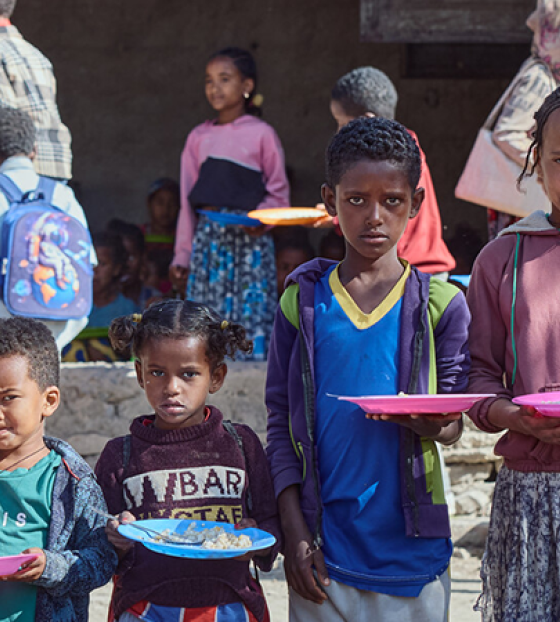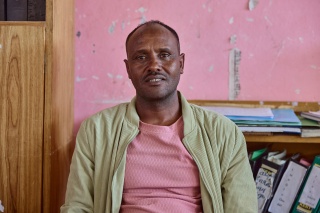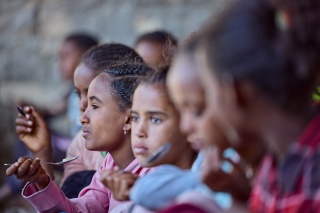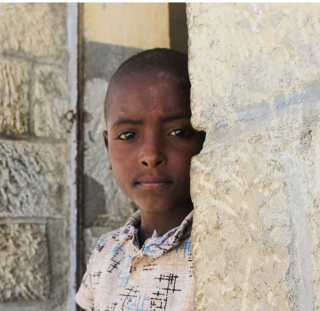
The school that stood strong in a war zone
Resilient in the face of war, the community around Beati Akor Primary School tried to make the impossible possible by continuing to provide a space for learning during one of the deadliest conflicts of the 21st century.
We first met Head teacher Tsegay Mehari in 2019. Back then, his school was a shining example in the community; his office proudly decorated with medals and trophies showcasing the pupils’ achievements. Nobody could have predicted what came next.
Disruption caused by Covid-19 was followed by two years of brutal civil war between November 2020 and November 2022. Now a devastating drought is the latest onslaught.
Nobody would blame Tsegay if he felt like giving up. But he never did.
In this interview, Tsegay explains how the school and its community persevered through incredibly dark times to do right by the pupils and describes the role of Mary’s Meals in helping everyone look to a better future once more.
Before the war
“Before the conflict, Beati Akor Primary School was a centre of excellence for the whole region. There was a high performance and it was a role model for other schools. But during the conflict, this school was damaged and the total number of the students that were out of school was high. Before the conflict, we had 730 students. During the conflict, it decreased to 261.
“I was very sad to see the school when it was closed. Our students were passing their time out of school, they were familiar with seeing weapons. It was very bad to see this. You like to see students playing in school and preparing school materials and teachers preparing teaching materials, but their attitude and their practice was totally shifted ... I was very sad.”

Keeping the school safe
It is estimated that 600,000 people lost their lives during Tigray’s civil war. It was a truly horrific conflict that caused millions of people to flee their homes for safety. At Beati Akor Primary School, teachers and community members – amid widespread violence and extraordinary risk to their own selves – made the decision to return to the school, and remarkably, they managed to keep it open.
People did their best to keep the school safe at the teachers’ request and save the raw school materials from damage. Some even approached the soldiers and pleaded with them to ‘keep their school effective’. The school didn’t escape the physical impact of war, but where possible, some attempts at learning continued. As Tsegay explains: “While the conflict was ongoing in Tigray, the teachers motivated themselves to come back. They taught without any salary for over a year.
“We’re not there yet, soldiers used the school as a camp during [part of] the war and the main gate of the school is damaged, the door is absent. The windows in the library are damaged, because of bombs.
“The war turned back the school. The impact of the war also means that our students are not learning according to their age levels. Because they have missed out on several years of school. Even mentally, they are psychologically damaged. They have trauma. Because they saw different kinds of war activities, their academic performance is not the same as before.
“The war caused great damage to the school, but the school community has started to rehabilitate. Previously, we got a lot of awards from different governments and different NGOs and now we are trying to have a good performance, just like before.”

The impact of school meals
Teachers did all that they could to encourage children to return to school, but the risks of war and the devastating levels of hunger meant that many stayed away. Some children were working, others begging, others left with their families in search of a new beginning. Tsegay is adamant it was the reintroduction of school meals (after the war was over) that made all the difference and brought students back to the classrooms in significant numbers.
“During the conflict, the feeding programme was closed too. Now that it has started back again, the number of students has highly increased. Now we have more than 1,000 students. They have all come back because of the feeding programme.
“Clearly, the feeding programme has a great impact in enrolment, but also in academic performance. Our hope is to make this school a role model not only for this country, but an international model school. A high-performing school of achievement. We will try to be successful.
“The feeding programme has other benefits, it helps the community too. There is high need here and the feeding programme helps by providing food for their children, it is a great help for society.
“In Tigray right now, the hunger level is very high. There are so many internally displaced people. Drought is happening in Tigray at this time. There was coronavirus, after that the war, then the drought. So much damage created in Tigray. The community needs help.”
Thank you for all that you do to help to provide reliable school meals for the children of Beati Akor Primary School. This consistent source of nutrition offers a lifeline that so many families are dependent on in this time of desperate need as the region is overwhelmed by hunger and food insecurity.
We are working tirelessly with our trusted partner to expand our school feeding programme in Tigray. If you are in a position to support us, please do – and help us reach the tens of thousands of children still waiting for the chance to start learning again. Please donate today.

